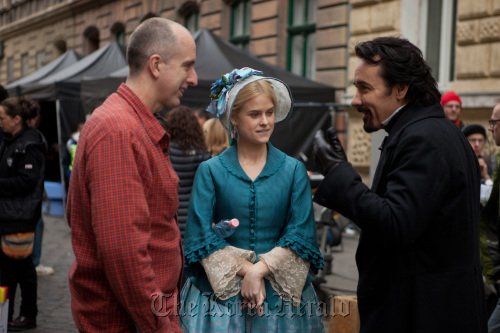‘The Raven’ reinvents life and work of Edgar Allan Poe as a horror fable
By Korea HeraldPublished : April 25, 2012 - 19:16
MIAMI ― This much we know is true: Edgar Allan Poe died on Oct. 7, 1849, at the age of 40, after having been found delirious and incoherent in the streets of Baltimore. His exact whereabouts in the few days previous remain unknown. His death has been attributed to everything from alcoholism to rabies to various medical conditions.
“The Raven,” the sleek and brooding thriller, offers a different and improbable ― but much less mundane ― solution to the mystery. The movie, which incorporates several of Poe’s best known tales into its narrative, also presents a side of the author far different from the usual somber persona of his biographies. Played by John Cusack in a fiery spin-wheel of a performance, Poe is an impetuous scoundrel: He’s arrogant yet insecure (“I despise people who despise me!”), funny yet abrasive (“I’d rather stand. It makes it easier to leave”), self-destructive yet relentless.
“The Raven,” the sleek and brooding thriller, offers a different and improbable ― but much less mundane ― solution to the mystery. The movie, which incorporates several of Poe’s best known tales into its narrative, also presents a side of the author far different from the usual somber persona of his biographies. Played by John Cusack in a fiery spin-wheel of a performance, Poe is an impetuous scoundrel: He’s arrogant yet insecure (“I despise people who despise me!”), funny yet abrasive (“I’d rather stand. It makes it easier to leave”), self-destructive yet relentless.

“There are a lot of beautiful-ugly paradoxes about the guy,” Cusack says. “We made sure to touch on all his different facets. He saw himself as a provocative and satirical writer. He was very aware his work was in bad taste. He had a great sense of shock value and gallows humor. But he was also very competitive and constantly attacking other writers. And he was intellectually ferocious. All those things help make him feel like an incredibly modern character, even though the story is set in 1849.”
Cusack believes that Poe’s willingness to transcend genre, confound expectations and challenge conformity ―in his poetry, fiction and work as a literary critic ― helped his legacy endure. Today, Poe is primarily remembered as one of the godfathers of modern horror: “The Pit and the Pendulum” and “The Tell-Tale Heart” can still stand up to whatever nasty business the “Hostel” or “Saw” movies serve up.
But Cusack sees more in Poe than frights, comparing the author to contemporary godheads such as Kurt Cobain or Hunter S. Thompson ― two other artists who suffered greatly for their work to indelible effect.
“Poe was punk in a lot of ways,” Cusack says. “He was also a guy who mashed up genres and created new ones. He wrote esoteric poetry and pulp thrillers and cliffhangers and grotesqueries. He wrote stories where baboons were coming out of chimneys with razor blades to kill people. But he also had a great striving for beauty and he was a pioneer of the subconscious. He had his finger on the zeitgeist when it came to the neuroses and fears and terrors of the time, and he gave that stuff a voice. Today, anybody who suffers outwardly like he did is a high priest of pop culture, you know?”
By Rene Rodriguez
(McClatchy Newspapers)
(MCT Information Services)
-
Articles by Korea Herald











![[Today’s K-pop] BTS pop-up event to come to Seoul](http://res.heraldm.com/phpwas/restmb_idxmake.php?idx=644&simg=/content/image/2024/04/17/20240417050734_0.jpg&u=)





![[KH Explains] Hyundai's full hybrid edge to pay off amid slow transition to pure EVs](http://res.heraldm.com/phpwas/restmb_idxmake.php?idx=652&simg=/content/image/2024/04/18/20240418050645_0.jpg&u=20240418181020)

![[Today’s K-pop] Zico drops snippet of collaboration with Jennie](http://res.heraldm.com/phpwas/restmb_idxmake.php?idx=642&simg=/content/image/2024/04/18/20240418050702_0.jpg&u=)